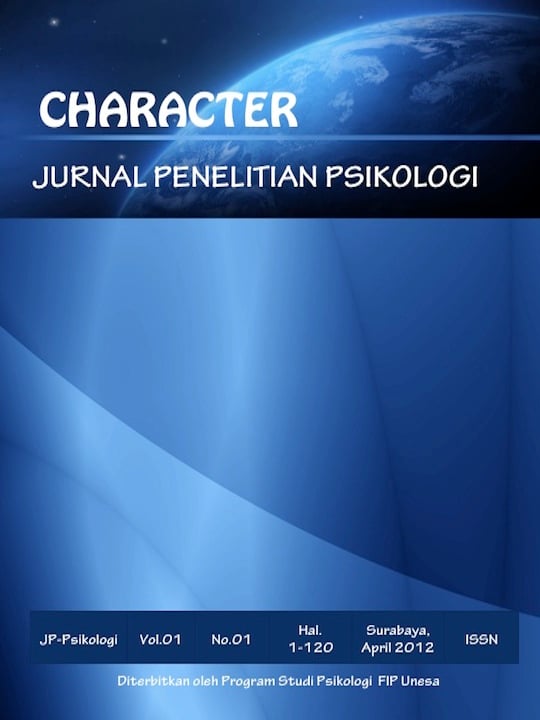HUBUNGAN ANTARA KOHESIVITAS KELOMPOK DENGAN KECENDERUNGAN SOCIAL LOAFING PADA MAHASISWA SELAMA MASA PEMBELAJARAN DARING
DOI:
https://doi.org/10.26740/cjpp.v8i3.41180Abstract
Abstrak
Social loafing merupakan perilaku individu untuk menurunkan kontribusi dan partisipasi ketika penyelesaian tugas secara kelompok dibandingkan ketika bekerja sendiri. Salah satu factor munculnya perilaku social loafing yaitu kohesivitas kelompok yang merupakan perasaan saling terikat satu sama lain yang muncul diantara anggota kelompok. Penelitian ini bertujuan untuk mengetahui hubungan antara kohesivitas kelompok dengan social loafing pada mahasiswa selama masa pembelajaran daring. Metode penelitian yang digunakan yaitu kuantitatif korelasional dengan alat ukur berupa skala kohesivitas kelompok dan skala social loafing yang telah diuji validitas dan reliabilitasnya. Sampel dalam penelitian ini sebanyak 183 mahasiswa psikologi angkatan 2018 Universitas Negeri Surabaya yang dipilih dengan menggunakan teknik cluster sampling. Teknik analisa data dalam penelitian ini menggunakan korelasi sederhana product moment pearson. Hasil dari penelitian ini sesuai dengan tujuan penelitian yang menunjukkan adanya hubungan negatif antara kohesivitas kelompok dengan social loafing pada mahasiswa psikologi angkatan 2018 selama masa pembelajaran daring. Koefisien korelasi dari penelitian ini menunjukkan nilai -0,550 (rhitung > 0,187) yang berarti terdapat hubungan negatif antara kohesivitas kelompok dan social loafing yang cukup kuat. Semakin tinggi kohesivitas kelompok maka semakin rendah social loafing. Kohesivitas kelompok sebagai faktor yang mempengaruhi social loafing, memberikan sumbangan penjelasan sebesar 30,25% dalam keragaman social loafing pada mahasiswa psikologi angkatan 2018 Universitas Negeri Surabaya.
Kata Kunci: kohesivitas kelompok, social loafing, mahasiswa, pembelajaran daring
Abstract
Social loafing is an individual's behavior to reduce contribution and participation when completing tasks in groups compared to when working alone. One factor in the emergence of social loafing behavior is group cohesiveness which is a feeling of being tied to one another that arises among group members. This study aims to determine the relationship between group cohesiveness and social loafing in students during the online learning period. The research method used is quantitative correlation with measuring instruments in the form of group cohesiveness scale and social loafing scale which have been tested for validity and reliability. The sample in this study was 183 psychology students from the 2018 State University of Surabaya who were selected using the cluster sampling technique. The data analysis technique in this study uses a simple Pearson product moment correlation. The results of this study are in accordance with the research objectives which show a negative relationship between group cohesiveness and social loafing in psychology students class 2018 during the online learning period. The correlation coefficient of this study shows a value of -0.550 (rcount > 0.187) which means that there is a negative relationship between group cohesiveness and social loafing which is quite strong. The higher the group cohesiveness, the lower the social loafing. Group cohesiveness as a factor that affects social loafing, contributes an explanation of 30.25% in the diversity of social loafing in psychology students from the 2018 State University of Surabaya.
Keyword: group cohesiveness, social loafing, students, online learning
Downloads
Downloads
Published
How to Cite
Issue
Section
License
Authors who publish in this journal agree to the following terms:
Copyright in any article is held by the author.
The author grants the journal, publication rights with the work simultaneously licensed under a Creative Commons Attribution License that allows others to share the work with an acknowledgment of the work's authorship and initial publication in this journal.
Authors may enter into separate, additional contractual arrangements for the non-exclusive distribution of the journal's published version of the work (e.g., posting it to an institutional repository or publishing it in a book), with an acknowledgment of its initial publication in this journal.
Authors are permitted and encouraged to post their work online (e.g., in an institutional repository or on their website) prior to and during the submission process, as this can lead to productive exchanges, as well as earlier and greater citation of published work.
 Abstract views: 2255
,
Abstract views: 2255
, PDF Downloads: 1722
PDF Downloads: 1722





